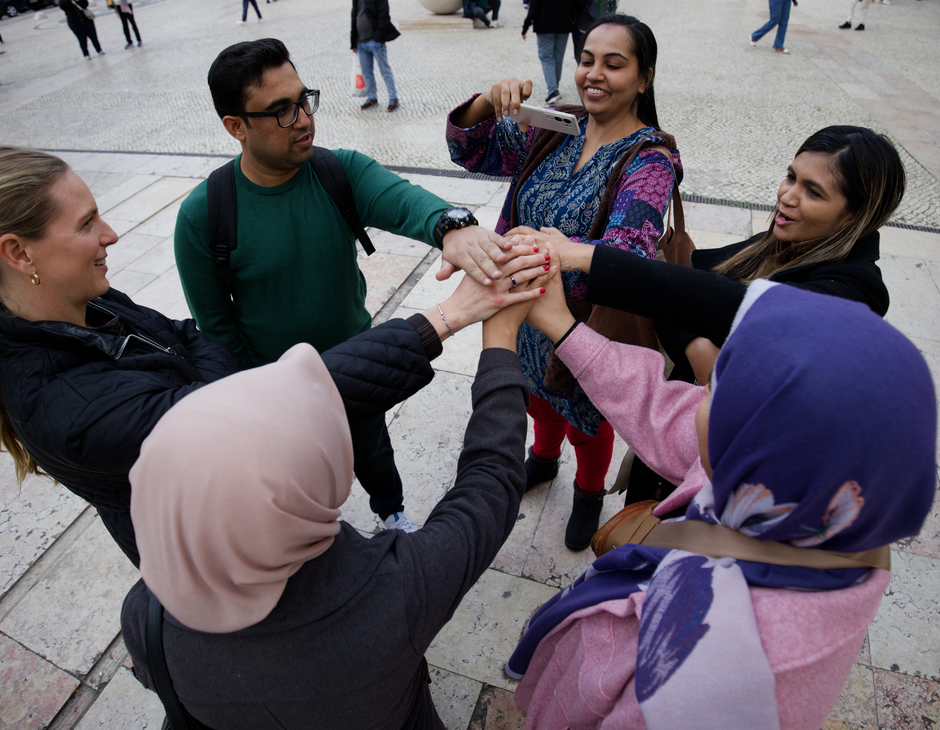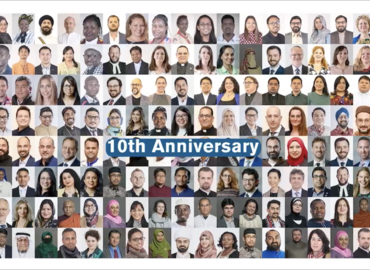KAICIID Launches 2025 Fellows Cohort, Marking a Decade of Impact in Interreligious Dialogue
The International Dialogue Centre - KAICIID proudly announces the launch of its 2025 International Fellows Programme Cohort, a milestone that marks the 10th anniversary of this flagship initiative. Since its inception in 2015, the KAICIID International Fellows Programme has grown into a dynamic platform dedicated to equipping global leaders with the tools and methodologies necessary to advance interreligious and intercultural dialogue (IRD/ICD) across the globe.
Out of 400 applicants, this year’s Fellows are exclusively drawn from top international, regional and national organizations, reinforcing the growing role of intergovernmental organizations (IGOs) and international non-governmental organizations (INGOs) in fostering global interreligious dialogue and signifying the growing commitment of global institutions to multifaith collaboration and secular-religious partnerships in peacebuilding and sustainable development.
Global Leadership and Diversity: A Cohort Reflecting Multilateral Collaboration
The 2025 KAICIID Fellows Cohort represents a truly global and diverse network of leaders shaping the future of interreligious and intercultural dialogue. This year’s Fellows come from some of the world’s most influential international institutions, including the United Nations Secretary-General’s Office, the United Nations Development Programme (UNDP), the International Organization for Migration (IOM), the Organization for Security and Co-operation in Europe (OSCE), and the Organization of Islamic Cooperation (OIC), among others. Alongside these intergovernmental bodies, the cohort also includes representatives from leading international NGOs, such as Tearfund and World Vision International, whose work spans humanitarian aid, peacebuilding, and social justice.
Reflecting the programme’s commitment to inclusive leadership, this year’s Fellows come from 14 different nationalities, collectively representing 21 countries. Their diverse backgrounds underscore the programme’s role in fostering cross-cultural and cross-sectoral dialogue, ensuring that voices from different regions, faith traditions, and institutional frameworks contribute to a more collaborative and unified global discourse.
Additionally, the 2025 cohort maintains a strong commitment to gender balance and religious diversity, with 69% women (11 Fellows) and 31% men (5 Fellows). The Fellows represent a rich tapestry of faith traditions, including Judaism, Buddhism, Christianity, and Islam, with a variety of denominational backgrounds within these religions. Their participation in the programme highlights the power of interfaith collaboration in addressing shared global challenges from conflict resolution and social cohesion to migration, sustainable development, and policy advocacy.
By bringing together secular and faith-based actors from different institutions, disciplines, and worldviews, the 2025 KAICIID Fellows Cohort exemplifies the programme’s vision: to build a network of global leaders who champion dialogue as a pathway to peace and sustainable development.
Voices of Change: Fellows Shaping the Global IRD Agenda
The 2025 KAICIID Fellows Cohort brings together visionaries, changemakers, and thought leaders who are shaping the future of interreligious and intercultural dialogue (IRD/ICD) at the highest levels. Their diverse backgrounds; spanning intergovernmental organizations, international NGOs, policy institutions, and grassroots networks, demonstrate a growing recognition of the role faith actors and multilateral collaborations play in global governance and peacebuilding.
At a time when religious and cultural narratives are often misinterpreted or politicized, these Fellows represent a powerful counterforce, working to bridge divides, dispel misconceptions, and advance social cohesion. Their expertise cuts across multiple fields, including conflict resolution, migration and refugee integration, human rights advocacy, gender equality, countering violent extremism, and youth engagement in dialogue. By leveraging their positions within key institutions, they are actively ensuring that faith-based perspectives are not only included but also valued in policy frameworks, humanitarian efforts, and global development strategies.
Beyond institutional roles, these Fellows embody the practical application of dialogue principles. Many have dedicated their careers to translating interfaith dialogue into real-world action, whether through advising governments, shaping international legal frameworks, or developing community-driven initiatives that promote peaceful coexistence. Their participation in the KAICIID Fellows Programme is not just an opportunity for personal and professional growth but also a strategic investment in expanding the global network of dialogue practitioners who influence decision-making at all levels.
A Decade of Building Bridges
Reflecting on the programme’s significance, KAICIID Acting Secretary-General António de Almeida-Ribeiro emphasized in his opening remarks:
At KAICIID, we deeply believe in the power of multi-stakeholder cooperation to foster dialogue, peace, and cohesion. By convening secular and religious alliances, we create a space where diverse voices can collaborate to tackle some of today’s most pressing issues. To address our communities’ urgent needs, we need to foster long-term, transformative change; change that begins with all of us, here and now. The Fellows Programme is rooted precisely in this noble cause: to build bridges among those who are different from each other, to connect people from diverse cultural and religious backgrounds into an inclusive environment, instilling in them a curiosity and desire to learn more about one another, not despite their differences, but because of them.
The Fellows Journey Ahead: A Year of Growth and Impact
The 2025 KAICIID Fellows are embarking on a transformative year—one that will equip them with the skills, knowledge, and networks to drive interreligious and intercultural dialogue at the highest levels.
Throughout the programme, Fellows will engage in intensive training, hands-on learning, and cross-sector collaboration, strengthening their ability to bridge divides and foster peaceful coexistence. With a focus on leadership, policy engagement, and practical dialogue methodologies, they will:
-
Redefine leadership in the context of faith-based and intergovernmental cooperation.
-
Challenge misconceptions and promote narratives that build understanding.
-
Apply interreligious dialogue strategies to real-world conflicts and policy discussions.
Since 2015, more than 550 KAICIID Fellows have graduated from this prestigious programme, forming a global network of dialogue practitioners committed to creating meaningful change. These alumni continue to mentor, collaborate, and implement initiatives that advance peace and mutual understanding.
As the 2025 Cohort steps into this journey, their impact will extend beyond their organizations - strengthening the role of interfaith collaboration in sustainable development, conflict resolution, and social cohesion worldwide. With this initiative, KAICIID reaffirms its commitment to empowering a new generation of leaders dedicated to building bridges, fostering trust, and shaping a more inclusive future.
As the 2025 KAICIID Fellows embark on this journey, their work will shape the future of interreligious dialogue at the highest levels. Their impact will resonate across global institutions, creating new pathways for peace, collaboration, and understanding in an increasingly complex world.
The Acting Secretary General mentioned in his speech: “We encourage you to embrace your role as agents of dialogue. You hold the key to making our societies a better place and put into action your learning experience in deconstructing misconceptions and challenging emerging trends. We at KAICIID will stand by you as our agents for peace in inspiring change and bridging divides."
The International Dialogue Centre - KAICIID is pleased to announce the selection of 35 new Fellows for its 2026 cohort,…



